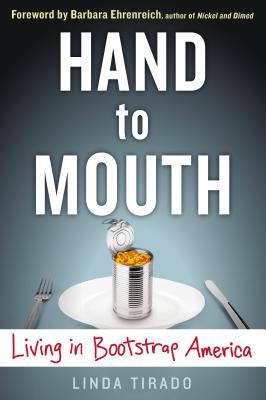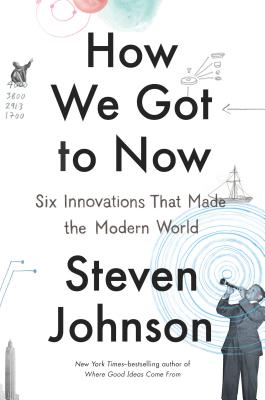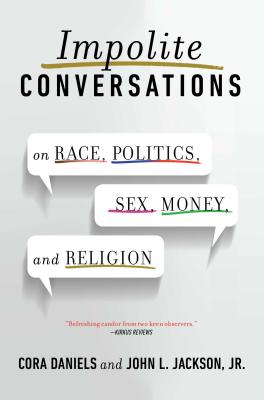From the New York Times–bestselling author of Where Good Ideas Come From and Everything Bad Is Good for You, a new look at the power and legacy of great ideas. In this illustrated volume, Steven Johnson explores the history of innovation over centuries, tracing facets of modern life (refrigeration, clocks, and eyeglass lenses, to name a few) from their creation by hobbyists, amateurs, and entrepreneurs to their unintended historical consequences. Filled with surprising stories of accidental genius and brilliant mistakes—from the French publisher who invented the phonograph before Edison but forgot to include playback, to the Hollywood movie star who helped invent the technology behind Wi-Fi and Bluetooth—How We Got to Now investigates the secret history behind the everyday objects of contemporary life.
In his trademark style, Johnson examines unexpected connections between seemingly unrelated fields: how the invention of air-conditioning enabled the largest migration of human beings in the history of the species—to cities such as Dubai or Phoenix, which would otherwise be virtually uninhabitable; how pendulum clocks helped trigger the industrial revolution; and how clean water made it possible to manufacture computer chips. Accompanied by a major six-part television series on PBS, How We Got to Now is the story of collaborative networks building the modern world, written in the provocative, informative, and engaging style that has earned Johnson fans around the globe.
When was the last time you said everything on your mind without holding back?
In this no-holds-barred discussion of America's top hot-button issues, a journalist and a cultural anthropologist express opinions that are widely held in private--but rarely heard in public.
Everyone edits what they say. It's a part of growing up. But what if we applied tell-it-like-it-is honesty to grown-up issues? In Impolite Conversations, two respected thinkers and writers openly discuss five "third-rail" topics--from multi-racial identities to celebrity worship to hyper-masculinity among black boys--and open the stage for honest discussions about important and timely concerns.
Organized around five subjects--Race, Politics, Sex, Money, Religion--the dialogue between Cora Daniels and John L. Jackson Jr. may surprise, provoke, affirm, or challenge you. In alternating essays, the writers use reporting, interviews, facts, and figures to back up their arguments, always staying firmly rooted in the real world. Sometimes they agree, sometimes they don't, but they always reach their conclusions with respect for the different backgrounds they come from and the reasons they disagree.
Whether you oppose or sympathize with these two impassioned voices, you'll end up knowing more than you did before and appreciating the candid, savvy, and often humorous ways in which they each take a stand.
 "I’ve been waiting for this book for a long time. Well, not this book, because I never imagined that the book I was waiting for would be so devastatingly smart and funny, so consistently entertaining and unflinchingly on target. In fact, I would like to have written it myself – if, that is, I had lived Linda Tirado’s life and extracted all the hard lessons she has learned. I am the author of Nickel and Dimed, which tells the story of my own brief attempt, as a semi-undercover journalist, to survive on low-wage retail and service jobs. Tirado is the real thing."
"I’ve been waiting for this book for a long time. Well, not this book, because I never imagined that the book I was waiting for would be so devastatingly smart and funny, so consistently entertaining and unflinchingly on target. In fact, I would like to have written it myself – if, that is, I had lived Linda Tirado’s life and extracted all the hard lessons she has learned. I am the author of Nickel and Dimed, which tells the story of my own brief attempt, as a semi-undercover journalist, to survive on low-wage retail and service jobs. Tirado is the real thing."
~from the foreword by Barbara Ehrenreich, New York Times bestselling author of Nickel and Dimed
We in America have certain ideas of what it means to be poor. Linda Tirado, in her signature brutally honest yet personable voice, takes all of these preconceived notions and smashes them to bits. She articulates not only what it is to be working poor in America (yes, you can be poor and live in a house and have a job, even two), but what poverty is truly like—on all levels. In her thought-provoking voice, Tirado discusses how she went from lower-middle class, to sometimes middle class, to poor and everything in between, and in doing so reveals why “poor people don’t always behave the way middle-class America thinks they should.”
They left everything behind to follow their hearts. . . . True stories that illuminate the experiences of British war brides in America after World War II
American soldiers stationed in the UK came away winning more than just a war, they also won the hearts of young women across Britain. At the end of World War II, more than 70,000 GI brides followed the men they'd married--men they barely knew--to begin a new life in the United States. Meet four of these women:
Sylvia Bradley, a loyal, bright-eyed optimist Rae Brewer, a resourceful, quick-witted tomboy Margaret Boyle, an English beauty who faced down every challenge Gwendolyn Rowe, a brave woman ahead of her time.
Though all made the bold choice to leave family and the world they knew, the journey each experienced was unique--ranging from romantic to heartbreaking.
Fascinating and unforgettable, GI Brides pays homage to these brave women, propelled by love and hope, who embarked on an adventure that would change their lives.
In his trademark style, Johnson examines unexpected connections between seemingly unrelated fields: how the invention of air-conditioning enabled the largest migration of human beings in the history of the species—to cities such as Dubai or Phoenix, which would otherwise be virtually uninhabitable; how pendulum clocks helped trigger the industrial revolution; and how clean water made it possible to manufacture computer chips. Accompanied by a major six-part television series on PBS, How We Got to Now is the story of collaborative networks building the modern world, written in the provocative, informative, and engaging style that has earned Johnson fans around the globe.
When was the last time you said everything on your mind without holding back?
In this no-holds-barred discussion of America's top hot-button issues, a journalist and a cultural anthropologist express opinions that are widely held in private--but rarely heard in public.
Everyone edits what they say. It's a part of growing up. But what if we applied tell-it-like-it-is honesty to grown-up issues? In Impolite Conversations, two respected thinkers and writers openly discuss five "third-rail" topics--from multi-racial identities to celebrity worship to hyper-masculinity among black boys--and open the stage for honest discussions about important and timely concerns.
Organized around five subjects--Race, Politics, Sex, Money, Religion--the dialogue between Cora Daniels and John L. Jackson Jr. may surprise, provoke, affirm, or challenge you. In alternating essays, the writers use reporting, interviews, facts, and figures to back up their arguments, always staying firmly rooted in the real world. Sometimes they agree, sometimes they don't, but they always reach their conclusions with respect for the different backgrounds they come from and the reasons they disagree.
Whether you oppose or sympathize with these two impassioned voices, you'll end up knowing more than you did before and appreciating the candid, savvy, and often humorous ways in which they each take a stand.
 "I’ve been waiting for this book for a long time. Well, not this book, because I never imagined that the book I was waiting for would be so devastatingly smart and funny, so consistently entertaining and unflinchingly on target. In fact, I would like to have written it myself – if, that is, I had lived Linda Tirado’s life and extracted all the hard lessons she has learned. I am the author of Nickel and Dimed, which tells the story of my own brief attempt, as a semi-undercover journalist, to survive on low-wage retail and service jobs. Tirado is the real thing."
"I’ve been waiting for this book for a long time. Well, not this book, because I never imagined that the book I was waiting for would be so devastatingly smart and funny, so consistently entertaining and unflinchingly on target. In fact, I would like to have written it myself – if, that is, I had lived Linda Tirado’s life and extracted all the hard lessons she has learned. I am the author of Nickel and Dimed, which tells the story of my own brief attempt, as a semi-undercover journalist, to survive on low-wage retail and service jobs. Tirado is the real thing."~from the foreword by Barbara Ehrenreich, New York Times bestselling author of Nickel and Dimed
We in America have certain ideas of what it means to be poor. Linda Tirado, in her signature brutally honest yet personable voice, takes all of these preconceived notions and smashes them to bits. She articulates not only what it is to be working poor in America (yes, you can be poor and live in a house and have a job, even two), but what poverty is truly like—on all levels. In her thought-provoking voice, Tirado discusses how she went from lower-middle class, to sometimes middle class, to poor and everything in between, and in doing so reveals why “poor people don’t always behave the way middle-class America thinks they should.”
They left everything behind to follow their hearts. . . . True stories that illuminate the experiences of British war brides in America after World War II
American soldiers stationed in the UK came away winning more than just a war, they also won the hearts of young women across Britain. At the end of World War II, more than 70,000 GI brides followed the men they'd married--men they barely knew--to begin a new life in the United States. Meet four of these women:
Sylvia Bradley, a loyal, bright-eyed optimist Rae Brewer, a resourceful, quick-witted tomboy Margaret Boyle, an English beauty who faced down every challenge Gwendolyn Rowe, a brave woman ahead of her time.
Though all made the bold choice to leave family and the world they knew, the journey each experienced was unique--ranging from romantic to heartbreaking.
Fascinating and unforgettable, GI Brides pays homage to these brave women, propelled by love and hope, who embarked on an adventure that would change their lives.



No comments:
Post a Comment